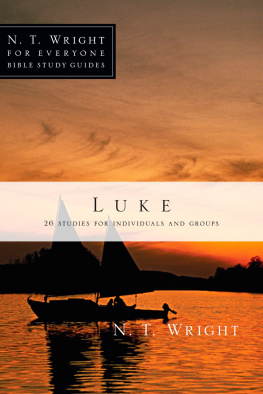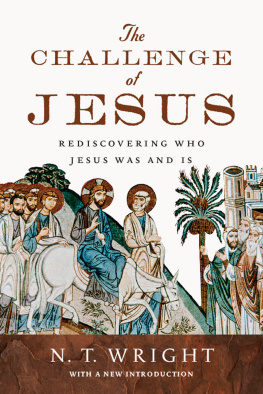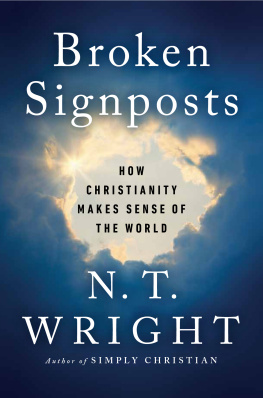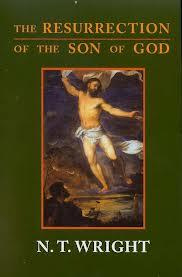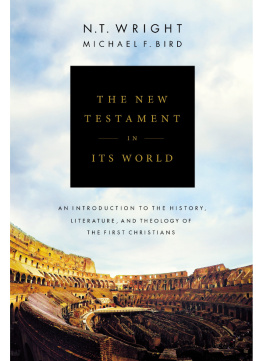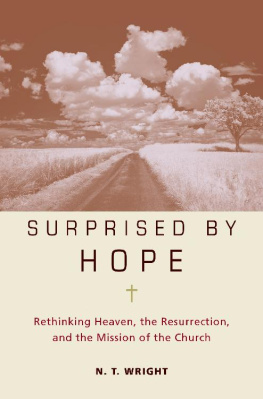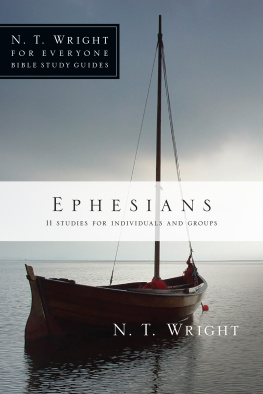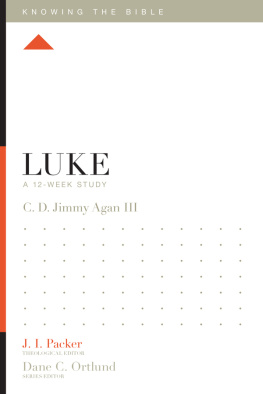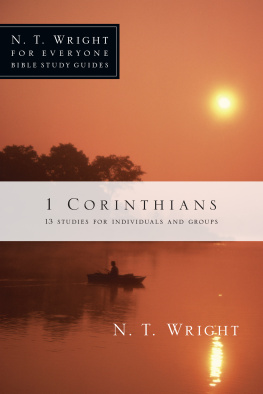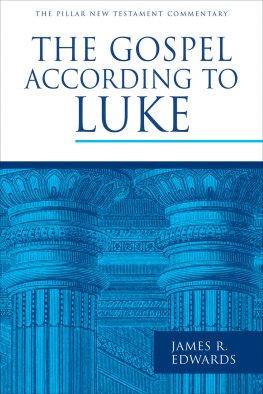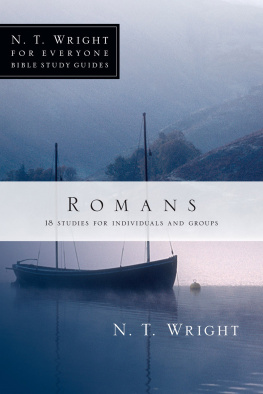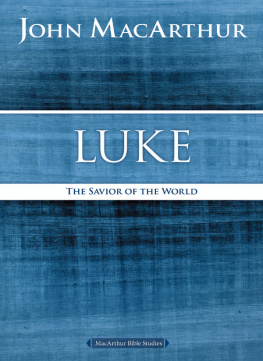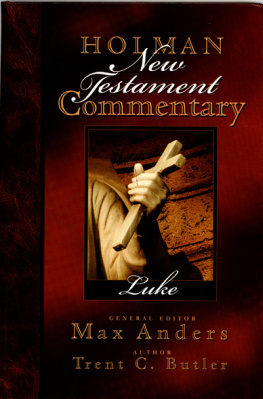N. T. Wright - Luke
Here you can read online N. T. Wright - Luke full text of the book (entire story) in english for free. Download pdf and epub, get meaning, cover and reviews about this ebook. year: 2011, publisher: InterVarsity Press, genre: Religion. Description of the work, (preface) as well as reviews are available. Best literature library LitArk.com created for fans of good reading and offers a wide selection of genres:
Romance novel
Science fiction
Adventure
Detective
Science
History
Home and family
Prose
Art
Politics
Computer
Non-fiction
Religion
Business
Children
Humor
Choose a favorite category and find really read worthwhile books. Enjoy immersion in the world of imagination, feel the emotions of the characters or learn something new for yourself, make an fascinating discovery.
- Book:Luke
- Author:
- Publisher:InterVarsity Press
- Genre:
- Year:2011
- Rating:4 / 5
- Favourites:Add to favourites
- Your mark:
- 80
- 1
- 2
- 3
- 4
- 5
Luke: summary, description and annotation
We offer to read an annotation, description, summary or preface (depends on what the author of the book "Luke" wrote himself). If you haven't found the necessary information about the book — write in the comments, we will try to find it.
Luke — read online for free the complete book (whole text) full work
Below is the text of the book, divided by pages. System saving the place of the last page read, allows you to conveniently read the book "Luke" online for free, without having to search again every time where you left off. Put a bookmark, and you can go to the page where you finished reading at any time.
Font size:
Interval:
Bookmark:



InterVarsity Press
P.O. Box 1400, Downers Grove, IL 60515-1426
World Wide Web: www.ivpress.com
E-mail:
2011 by Nicholas Thomas Wright
All rights reserved. No part of this book may be reproduced in any form without written permission from InterVarsity Press.
This study guide is based on and includes excerpts adapted from Luke for Everyone, 2001, 2004 Nicholas Thomas Wright. All Scripture quotations, unless otherwise indicated, are taken from the New Testament for Everyone. Copyright 2001-2008 by Nicholas Thomas Wright. Used by permission of SPCK, London. All rights reserved.
InterVarsity Press is the book-publishing division of InterVarsity Christian Fellowship/USA, a movement of students and faculty active on campus at hundreds of universities, colleges and schools of nursing in the United States of America, and a member movement of the International Fellowship of Evangelical Students. For information about local and regional activities, write Public Relations Dept., InterVarsity Christian Fellowship/USA, 6400 Schroeder Rd., P.O. Box 7895, Madison, WI 53707-7895, or visit the IVCF website at .
Design: Cindy Kiple
Cover image: Jupiterimages
ISBN 978-0-8308-6913-8 (digital)
ISBN 978-0-8308-2183-9 (print)
This digital document has been produced by Nord Compo.
OUT OF LUKE

I magine a village in ancient Palestine. They didnt have printed books or newspapers, television or radio. They had official storytellers. Some great event would happen: an earthquake, a battle or the visit of an emperor. Within a day or two the story would be told all round the village, and would settle into a regular form. Everyone would know the story, but some of the better storytellers in the village would be recognized by the others as the right people to tell it.
And thats what theyd do. They wouldnt change the story or modify it; if they did, people would notice and set them straight. So when Luke went round the villages of Palestine and Syria in the second half of the first century, listening to the stories told by the accredited storytellersthe stewards of the word, as he calls themhe would know he was in touch with solid, reliable evidence that went right back to the early events. Plato had said, five hundred years earlier, that there was a danger in writing things down; human memories, he thought, were the best way to get things right and pass them on. In the century after Luke, one of the great Christian teachers declared that he preferred living testimony to writings. You cant tell where a book has come from, but you can look witnesses in the eye, and use your judgment about whether to trust them.
So, why is Luke writing it all down now? And who was Luke anyway? We actually dont know for certain who the author of this book was, but we call him Luke because thats who the church, from very early on, said had written this Gospel and the Acts of the Apostles too. He may well have been the Luke whom Paul mentions as his companion (Colossians 4:14; Philemon 24; 2 Timothy 4:11). He could have been writing any time between A.D. 50 and 90. A fair guess is that the author is Luke, one of Pauls companions, and that he was writing in the 60s or 70s. Why write such a book now?
The main reason is that the message about Jesus has spread far and wide, way beyond the original communities in the regions Jesus himself visited. Peter, Paul and other missionaries had carried the message in all directions, and doubtless there were garbled, muddled and misleading reports circulating about who exactly Jesus was, what he did and said, and what had happened to him. Luke knows of other writings that have begun the task of putting it down on paper, but he has a wider audience in mind, an educated, intelligent, enquiring public.
A further reason, if indeed Luke is writing in the late 60s and 70s, would be the horrendous war that was raging in Palestine at the time. The Jews rebelled against the occupying Roman forces in 66, until finally, after a long siege, Jerusalem was destroyed in 70. The result was that many towns and villages where Jesus had been seen and known were decimated. Not only was the older generation dying out, but communities that had witnessed Jesus activities were being dispersed or destroyed. The stories, which depended for transmission on a peaceful, stable society, were in danger of dying out. Unless steps were taken to write them down, the message would not be passed on to the next generation. And since Luke, like all the early Christians, believed that the things that had actually happened (what we would call the historical facts) had changed the course of the world, it was vital that they be presented as clearly and unambiguously as possible.
Luke thus constructs a grand doorway into his Gospel. He invites us to come in and make ourselves at home. Here we will find security, a solid basis for lasting faith.
1. As you begin each study, pray that God will speak to you through his Word.
2. Read the introduction to the study and respond to the Open question that follows it. This is designed to help you get into the theme of the study.
3. Read and reread the Bible passage to be studied. Each study is designed to help you consider the meaning of the passage in its context. The commentary and questions in this guide are based on my own translation of each passage found in the companion volume to this guide in the For Everyone series on the New Testament (published by SPCK and Westminster John Knox).
4. Write your answers to the questions in the spaces provided or in a personal journal. Each study includes three types of questions: observation questions, which ask about the basic facts in the passage; interpretation questions, which delve into the meaning of the passage; and application questions, which help you discover the implications of the text for growing in Christ. Writing out your responses can bring clarity and deeper understanding of yourself and of Gods Word.
5. Each session features selected comments from the For Everyone series. These notes provide further biblical and cultural background and contextual information. They are designed not to answer the questions for you but to help you along as you study the Bible for yourself. For even more reflections on each passage, you may wish to have on hand a copy of the companion volume from the For Everyone series as you work through this study guide.
6. Use the guidelines in the Pray section to focus on God, thanking him for what you have learned and praying about the applications that have come to mind.
1. Come to the study prepared. Follow the suggestions for individual study mentioned above. You will find that careful preparation will greatly enrich your time spent in group discussion.
2. Be willing to participate in the discussion. The leader of your group will not be lecturing. Instead, she or he will be asking the questions found in this guide and encouraging the members of the group to discuss what they have learned.
Font size:
Interval:
Bookmark:
Similar books «Luke»
Look at similar books to Luke. We have selected literature similar in name and meaning in the hope of providing readers with more options to find new, interesting, not yet read works.
Discussion, reviews of the book Luke and just readers' own opinions. Leave your comments, write what you think about the work, its meaning or the main characters. Specify what exactly you liked and what you didn't like, and why you think so.

